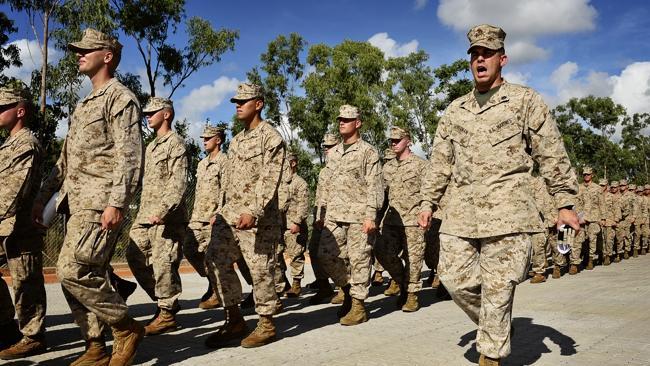Darwin port’s profit our security loss?
Security concerns are being raised over the leasing of the NT port to Chinese interests.

A senior American official bemused by the bargain-basement lease of Darwin’s strategically important port to a Chinese company notes that it amounts to not much more than $US3 million ($4.2m) a year — and suggests the 2500 US marines who would train there are likely to spend more than that each year on beer.
That’s a lot of Darwin stubbies, but the American is making the point that the $506m, 99-year lease has triggered an intense debate on possible threats to national security for a very small price.
Notwithstanding the closeness of the US-Australia alliance, Washington and Canberra have different priorities when it comes to their relationships with China and the development of resources in a massive but cash-strapped chunk of northern Australia.
Blurring the realities of the port issue and the regional strategic picture is the complete uncertainty about Beijing’s intentions in the East and the South China Sea. It is far from clear what military objectives China wants to achieve in the vast area of ocean it seeks to control stretching out to what it calls its “nine-dash line”.
To signal Australia’s concerns, since long before the debate over the security of Darwin began, the Royal Australian Navy and the Royal Australian Air Force have been sending increased numbers of warships and long-range patrol aircraft through contested areas such as the Spratly Islands.
Darwin’s port was a crucial staging point for the intervention in East Timor in September 1999, and the local air base is the RAAF’s second busiest in terms of aircraft movements.
Whatever the claims and counterclaims about Darwin and national security, it is not surprising that the Northern Territory government went looking for money to improve the port’s facilities and make it a more effective gateway to Asia.
Northern Territory Treasury officials told a Senate inquiry in Canberra this week their government opted to lease the port because the federal government repeatedly refused to fund the necessary modernisation.
Whatever happens in strategic terms, the coming year will see a significant increase in the resources and responsibilities of the Foreign Investment Review Board. The Senate committee is investigating the effectiveness of the FIRB process, including whether it offers sufficient safeguards for critical infrastructure on national security grounds.
During the hearing, Department of Defence secretary Dennis Richardson and Duncan Lewis, chief of domestic intelligence agency ASIO, both stressed that the national security implications of the lease had been thoroughly and professionally examined, and they had no issues with the lease proceeding.
But Richardson also said it had become clear during that examination that even if the deal were considered a threat, Australia’s FIRB process could not have been used to block it.
That issue was then raised at a meeting of the national security committee of cabinet in October and Malcolm Turnbull asked Scott Morrison to investigate whether the FIRB had the authority and resources to properly examine national security issues.
Treasury is carrying out that investigation.
The US was assured soon after the NSC meeting that the issue would be sorted out. The American system known as CFIUS, the Committee on Foreign Investment in the United States, is much more rigorous and likely to block sales to foreign entities because of national security concerns.
As an early step, Morrison announced David Irvine, formerly director-general of ASIO and of its counterpart, ASIS, which operates overseas, would join the FIRB. With him will be former Rio Tinto Australia chief David Peever, who headed a review of efficiency in the Defence Department and the Australian Defence Force for the Abbott government.
The appointments reflect concern within the government about the extent of Chinese engagement in the Australian economy, the possibility that companies with connections to the Chinese military, in particular, may pose security threats, and the political sensitivity surrounding such leases and sales.
The Treasurer said Irvine and Peever would bring a deep knowledge and extensive experience of the region from a national security and a commercial perspective. It would be increasingly important for the FIRB to have not only the commercial expertise and background to deal with complex transactions but also to have a deep understanding of the broader strategic issues essential to protecting the national interest, he said.
Security concerns were among the reasons the government last month rejected the takeover of the Kidman cattle properties by Chinese bidders. The properties are close to the Woomera testing range.
Security concerns also have been raised locally and in the US over the Darwin port lease and the lease of the NSW power network, Transgrid, to Chinese investors.
The Americans were particularly concerned about the length of the Darwin lease and the extent to which both geopolitical circumstances and surveillance technologies could change in a century.
Other factors were the lack of consultation with Washington, given that the US had agreed to increase to about 2500 the number of marines rotating through the port for several months of each year; and what was considered to be the failure of the FIRB to take account of the national security implications of the lease for Australia or its ally.
Richardson tells The Australian that while the US should have been consulted about the lease, it did not pose a security threat to Australia or its ally, and consultation would not have changed the decision.
As the Senate inquiry continued, the American embassy issued a statement saying the US was aware of the Northern Territory government’s intent to lease the port. “Our concerns had to do with potential security considerations, the details of the lease, and the federal government’s review of both,” the embassy said. “We have since had substantial subsequent discussions about those concerns, which have been resolved. We are now moving forward together — as mature friends and allies do.”
Peter Jennings, a former senior Defence official who heads the Australian Strategic Policy Institute think tank, says he believes the lease, given its length, does pose a threat and he believes it could help China gather intelligence from Australian and allied warships visiting the port.
Richardson says that is “absurd” and that warships entering a commercial port would turn off sensitive equipment, anyway.
Richardson says claims that the port lease is part of a broader Chinese strategic play to give its navy access to Darwin are also absurd. All of the national security issues were thoroughly examined by Defence and security agencies, which concluded that the lease posed no threat, he says: “This is an issue we looked at very carefully,” he says.
Those who believe the lease does not pose a threat include Chief of Navy Tim Barrett, says Richardson.
When concerns about the lease were published in the media, Richardson says, he asked relevant agencies to look again at the security implications in case something had been missed, but they had all come to the same conclusions.
Jennings says he is puzzled that Defence concluded that the port lease was acceptable. He says China would have significant interest in the movements of warships in and out of Darwin, adding that a more systematic FIRB process is needed to thoroughly examine the national security implications of sales and leases and that there needs to be a broader national interest test.
Jennings says he does not think the commonwealth will now take what he calls the drastic step of “unwinding” the lease.
Australia Defence Association executive director Neil James says whether the local decision to lease the commercial port for 99 years was sound or not, the way it was reached reveals a major problem that must be rectified in detail.
Darwin Harbour and the city provide the only location suitable for major naval use across northern Australia should this ever be necessary, James says.
“Despite subsequent spin by the NT and federal governments, what has really occurred is that a state/territory-level government, narrowly focused on short-term political expediency, took a major decision — which seriously affects the future strategic security of the whole country for a century — clearly without realising the long-term, detailed and broader implications,” says James.
James says he believes federal departments and agencies looked at the lease in specific and narrow silos, not holistically or in any form of a grand strategic context: “A proper grand strategic approach, rather than one focused on managing issues more in a day-to-day ‘strategic policy’ manner, is clearly needed both to prevent further mistakes about foreign control of key national infrastructure and to improve the context and quality of public debate about such issues.”
Preserving an appropriate degree of long-term national control over such key strategic infrastructure necessarily overrides any short-term and sectional interests locally, he says, especially where they arise from only parochially focused political expediency.
James, like Jennings, argues that the national security committee of cabinet should make such key decisions.
Landbridge, the Chinese company at the heart of the controversy, told the Senate inquiry that on the back of the China-Australia free-trade agreement it planned to buy much more Australian infrastructure, including oil and gas and tourism facilities. Last year Landbridge bought Australian oil and gas company Westside Corp.
The company stresses it has no links to China’s People’s Liberation Army.
Landbridge Infrastructure Australia managing director Michael Hughes told the Senate’s economics references committee, which is examining the port lease, that the company plans to invest heavily across the Top End.
‘We are very excited about the opportunities in northern Australia and the Northern Territory, in particular, across a range of sectors — mining, oil and gas, tourism, agribusiness and food,” he said.
Anne Tan, the Territory’s Acting Co-ordinator-General and the lead official on its Port of Darwin project, told the committee Landbridge already had paid the full $506m for the 99-year lease.
Hughes said the FTA had already stimulated growth in trade between the two nations. “Landbridge, with its business and relationships in China, we believe, can stimulate this growth between northern Australia and China,” he said, claiming the investment in Darwin’s port would be a catalyst for further investment.
James, however, describes the approval of the lease as a “grand strategic failure”.
“Our grandchildren may regret this,” he says. “A lot can change in 60 or 80 years’ time.”



